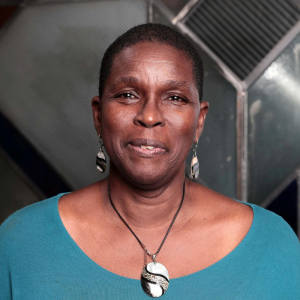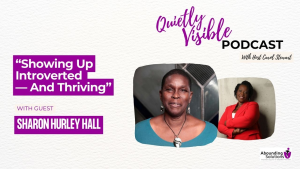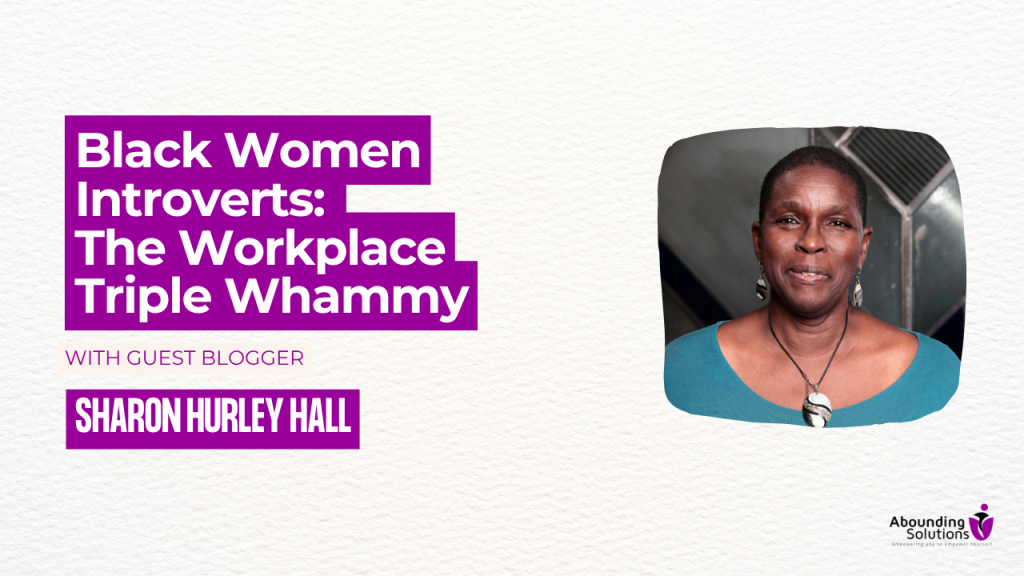As Kimberlé Crenshaw pointed out in her groundbreaking work on intersectionality, the layering of identities results in a unique experience of oppression. Though I wouldn't change any aspect of my identity, there's no denying that the combination of all three can result in some challenging experiences.
Here are four examples, some personal solutions, plus some tips on how advocates can support their introverted Black siblings.
1 . Presumed Incompetence
Honestly, sometimes you can't win. As a Black woman, if you're too loud and animated, you can be seen as pushy, aggressive and depending on the circumstances, angry. As a quiet Black woman, you play into other stereotypes that suggest Black folx aren't too bright, never mind that Black women are some of the most competent and credentialed people on the planet.
At a job fair training session, I sat at the back taking everything in, only to learn later that the trainer had presumed I wasn't getting it at all. He was totally amazed when I aced the final test. Similarly, I was sitting in a meeting room with 11 other people, 8 of them men. It was getting louder and louder and more overwhelming so I naturally got quieter and quieter. In the lull, I spoke up, surprising those who'd thought I was disengaged.
In diverse workplaces, our competence is constantly questioned despite our expertise. We've seen it in the news, with super qualified Black women facing unusual levels of scrutiny - think Nikole Hannah-Jones, Dianne Abbott, Ketanji Brown Jackson, Michelle Obama, I could go on.
My solution: make sure I take other opportunities to share my views in an email, a message or a 1:1.
2. The Exhaustion of Masking
As a Black person you probably spend a lot of your time in that double consciousness state outlined by WEB DuBois and Franz Fanon, where you are simultaneously aware of how you are and how you are seen. That can lead to code-switching everything from your hair and dress to your language and demeanour. Women are already socialised to make themselves small and not take up space. Black women want to avoid the loudness trap, while Black women introverts are trying to fake extroversion to fit in with prevailing workplace norms. All that faux enthusiasm at team meetings, ugh!
Then there's the hyper-vigilance - reading the room, checking your tone, your expression to make sure you're just enough and not too little or too much. These background processes are draining your social and mental battery - it's no wonder you end the day exhausted. Black women are stressed, y'all!
My solution: if there's a quiet room, use it. If not, a bathroom break can double as a recharge break.
3. Paying the Price for Authenticity
When you mask, and show up as your introverted Black self, then you pay the price. Skip the happy hours, after work drinks, team barbecues, paintballing and other team building activities, and your reputation suffers. "Not a team player" will stick to you like chewing gum and affect your promotion prospects, even if it's never said to your face.
Do the work of four people? No promotion for you, while your less dedicated white colleague races up the ladder. And as for a raise - why is there never any budget when it's your turn? Plus I'll say it again: there's the eternal dilemma of the Black woman introvert: you can't be too loud OR too quiet. Both count against you, so what are you to do?
My solution: unless the leadership is on board, there isn't one. It's why so many Black people change jobs to improve their prospects.
4. Experiencing Workplace Trauma
As Black women in the workplace, you're subject to multiple assaults on your mental wellbeing - and your person. Even if you're a leader, there's no guarantee an officious security guard won't want to randomly search your stuff or stop you. There's no guarantee you won't walk into a meeting room and be seen as the person who makes the tea. And there's no guarantee you won't face "casual" acts of racism (like can people leave your hair alone?). And in multiethnic spaces? I've spoken up with an idea, only to watch a white colleague repeat the exact same thing five minutes later and get praised for their insight whilst I'm invisible.
Meanwhile, you're expected to be the strong Black woman and just keep going. And heaven forfend you ask for support from another Black colleague, if you have one. Some of your white colleagues will view this as suspicious, adding another negative entry to the mental ledger they're maintaining. It's no wonder Black women love remote work That's even more important if you're introverted, as you can take time to decompress and recover.
My solution: build a coalition of supportive colleagues and agree your strategy in advance so you can get the most pressing or outrageous examples dealt with.
Showing Support for Black Women Introverts
So what can leaders and colleagues do about this? Glad you asked.
First, be aware that the introverted Black women in your team may be dealing with all of this. Make it your business to notice and to put policies and practices in place to address them.
Pay attention to share of voice: who’s speaking, and who’s quiet. Make space for Black women introverts to speak, and interrupt those who speak over them. If you as the leader model making that space, others in the team and company will follow.
Create opportunities for the quiet people to give their input, either before or after the meeting, by email or DM. And, importantly, openly acknowledge those contributions in front of the whole team.
It should go without saying, but I'll say it anyway: interrupt racism, microaggressions and microinvalidations wherever you see them.
Check that your policies aren't inadvertently discriminating. And for goodness sake, ensure everyone knows that out of work socialising doesn't count when assessing promotional prospects.
The triple whammy is real, and it's costly - to our energy levels, our career advancement, our mental wellbeing. But it doesn't have to be this way. When we identify and name these patterns and when advocates actively interrupt them, we create workplaces where Black women introverts can show up as ourselves and thrive. And that's good for everyone.
About Sharon Hurley Hall
 Sharon Hurley Hall (she/her) is an author, educator and anti-racism activist. A former journalist and writer with more than 30 years’ experience, Sharon is also the author of 'I'm Tired of Racism: True Stories of Existing While Black' and 'Exploring Shadeism'. Sharon's newsletter, Sharon’s Anti-Racism Newsletter, has become a trusted resource for thousands of subscribers seeking to understand and combat systemic racism. Through this platform, she shares personal insights, curated resources, and actionable strategies for anti-racism work in professional and personal contexts. Her most recent social justice initiative is the SHHARE anti-racism membership community, which she founded in late 2024.
Sharon Hurley Hall (she/her) is an author, educator and anti-racism activist. A former journalist and writer with more than 30 years’ experience, Sharon is also the author of 'I'm Tired of Racism: True Stories of Existing While Black' and 'Exploring Shadeism'. Sharon's newsletter, Sharon’s Anti-Racism Newsletter, has become a trusted resource for thousands of subscribers seeking to understand and combat systemic racism. Through this platform, she shares personal insights, curated resources, and actionable strategies for anti-racism work in professional and personal contexts. Her most recent social justice initiative is the SHHARE anti-racism membership community, which she founded in late 2024.
Quietly Visible Podcast - Showing Up Introverted — And Thriving
Sharon was a guest on Quietly Visible Podcast. You can watch her episode on YouTube, or listen on Spotify or Apple Podcasts.
Sharon shares her journey from journalism to activism, how she learned to embrace her introversion with confidence, and why being “intentionally visible” matters for quiet leaders. Exploring how introverts can raise their visibility through writing, share strategies for setting boundaries and avoiding burnout, and discuss the importance of creating introvert-friendly spaces.
Connect with Sharon

